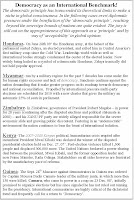 ocratization trajectory. Scholarly scrutiny has further contributed to legitimize the process and reinforce the widespread belief that democracy is the natural end point of a ‘normal’ course of political development.[1]
ocratization trajectory. Scholarly scrutiny has further contributed to legitimize the process and reinforce the widespread belief that democracy is the natural end point of a ‘normal’ course of political development.[1]Democracy and democratization has become a part of the mainstream of global dialogue and International and regional bodies reinstate this norm by projecting influence in a globalized world. The Security Council last week welcomed the power-sharing agreement reached by Madagascar's current and former leaders. The four past and present leaders - Andry Rajoelina, Marc Ravalomanana, Didier Ratsiraka and Albert Zafy - struck a deal following talks in Addis Ababa, Ethiopia, on 6th November.
Madagascar's political rivals have now agreed on posts within a transitional government that will hold power until next year's elections following a power struggle that brought months of volatility to the country. Andry Rajoelina will remain head of state, joined by two co-presidents representing other political factions on the island.
Rajoelina, a 35-year-old former DJ, was mayor of Madagascar's capital of Antananarivo when he overthrew democratically elected President Marc Ravalomanana in March after winning support from the military. The widely denounced takeover followed weeks of protests that claimed dozens of lives. African and Western nations called Rajoelina's
 takeover a coup, and the African Union and the Southern African Development Community suspended Madagascar's membership.
takeover a coup, and the African Union and the Southern African Development Community suspended Madagascar's membership.Mediators helped forge a power-sharing agreement in August but Rajoelina drew criticism for unilaterally forming a new government in September, violating an accord that demanded that all parties agree on appointments. His actions sparked demonstrations by supporters of the deposed former president demanding his return. With the latest power sharing deal in place elections are to be held by November 2010.
According to the AU the regional body would not re-admit Madagascar until the newly agreed power-sharing government is in place and fresh elections in the pipeline.
UN Secretary General Mr. Ban"s spokesperson said the UN would continue to support Madagascar "through the transition and beyond," led by former Mozambican president Joaquim Chissano, who has been working with the African Union (AU), the Southern African Development Community (SADC) and the International Organization of the Francophonie to mediate
 a solution to the political tensions. The Council further affirmed its support for the efforts of the United Nations in the process, including an election consultation team which was sent last week.
a solution to the political tensions. The Council further affirmed its support for the efforts of the United Nations in the process, including an election consultation team which was sent last week.Analysts say the deal will allow donors who suspended aid worth hundreds of millions of dollars to resume work with Madagascar without flouting their own democratic ideals. However, some diplomatic sources have said their governments will await the holding of free and fair elections before fully reinstating aid.
This case in point demonstrates how the democratic principle has been established as a universal norm and usually transcends the sovereign bounds of states. It is widely accepted as a value system similar to a moral set of ideals and is stepping up to assume the same status as perhaps genocide prevention and humanitarian intervention.
Even where some literature, especially in the Chinese academia is raising the debate to counter its infallibility, the concept’s strong hold on international imagination surfaces in diplomatic language. Even though in Madagascar’s case international bodies may not be proactively interfering on the domestic front, nevertheless it is quite evident that international pressure propels national leaders along democratic lines.
 Discussion Questions:
Discussion Questions:§ Would you agree that democratic principles have acquired the same standing as genocide prevention or humanitarian intervention?
§ Does diplomatic language over simplify the concept of democracy?
§ International Studies Quarterly, Vol. 51, No. 3, Sept 07’, ‘Envisioning China’s Political Future: Elite Responses to Democracy as a Global Constitutive Norm’, by David C. Lynch
§ http://www.google.com/hostednews/ap/article/ALeqM5hfV75EHUookBtBk2OlprGZBpDTzgD9BQPN4G0
§ http://www.nytimes.com/reuters/2009/11/07/world/international-uk-madagascar-crisis.html
§ http://www.thepeninsulaqatar.com/Display_news.asp?section=World_News&subsection=Rest+of+the+World&month=November2009&file=World_News200911081213.xml
§ http://allafrica.com/stories/200911160266.html
§ http://allafrica.com/stories/200911180006.html
§ http://www.un.org/democracyfund/XSituatingDemocracy.htm
[1] International Studies Quarterly, Vol. 51, No. 3, Sept 07’, ‘Envisioning China’s Political Future: Elite Responses to Democracy as a Global Constitutive Norm’, by David C. Lynch
________________________________________________________
Business and Politics in the Muslim World (BPM)refers to the project entitled, "Globalized Business and Politics: A View from the Muslim World.' The blog development project has been undertaken and jointly developed by the Gilani Research Foundation and BPM as a free resource and social discussion tool.
Please Preview Your Comments Before Posting.











